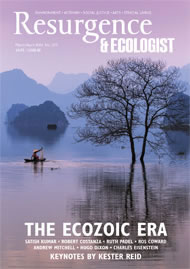Richard Pring was formerly Professor of Education and Director of Educational Studies at Oxford University. He is a distinguished philosopher of education, an advocate of the practice and philosophy of the American educator John Dewey. He is also a patron of Human Scale Education and a believer in the importance of human scale in the education of children and young people. The Resurgence Trust chair, James Sainsbury, in his New Year message last January, urged that human activities must be on a human scale, not an industrial scale, if we are to lead “good and purposeful” lives in harmony with Nature. Pring argues that education has a crucial role to play in developing in young people the values and attitudes that will enable them to lead such good and purposeful lives. He restates the true aims of education and shows how in the provision of secondary education we have failed to articulate these aims, let alone achieve them.
Before the 1944 Education Act, secondary education in Britain was the privilege of the few, and the majority of working-class children attended the non-fee-paying elementary school or central school up to the age of 14, to receive a basic training in skills. After 1944, all children were entitled to a free secondary education up to the age of 16. But the division of schools into a tripartite structure – grammar, secondary modern and technical – led to the separation of children into those who went to grammar school and those who did not, with the result that 20 years later a government report stated that “half our future” had not achieved the aspirations of 1944. The new comprehensive schools of the 1960s and 1970s were intended to bring together children of all abilities under one roof, but the industrial scale of these schools, and their reluctance – with some notable exceptions – to develop new approaches to learning and school organisation again led to frustration and failure for large numbers of young people. The dream of universal secondary education that would develop the talents of all children and prepare them for the democratic life and community living remained unrealised.
Today it would seem that the dream is even more remote. Comprehensive schools remain, but the cohesiveness of the school system has been shattered by the introduction of state-funded independent schools. These are academies, which have increased from 200 in 2010 to 2,400 today and are either ‘converter academies’ or ‘sponsored academies’ – free schools of every description, including faith schools and technical schools. It is a chaotic mix. Local Education Authorities are in a state of free fall, and the control of the whole system of 20,000 schools is vested in one person: the Secretary of State. In 1944 the Minister of Education had but three powers. In 2013 the Secretary of State has over 2,000. The fragmentation of the system has brought with it the entry of business interests, and the future may well lie with chains of for-profit schools being run by business. The language of business now shapes policymaking, and Pring is coruscating in his criticism of the “language of deliverology” and “management speak”.
Into the moral vacuum of a market-led education system, Pring injects the values of a person-centred education. He believes that the fundamental question to ask is: “What does it mean to be human?” In Pring’s view the essence of being human is “understanding, capability, community mindedness, moral seriousness and sense of dignity”, and the purpose of education is to develop these human attributes. Against this backcloth education takes on a different light. The experience of the learner becomes central and informs a wider vision of learning that combines the academic, the artistic and the practical to forge a common culture accessible to all children.
Other countries have pinned their faith in children and teachers and turned their backs on the quasi-market in education with its tests, targets and league tables. Finland, for example, has achieved the highest levels of educational attainment in the world – without constant testing and inspection. Pring sets out the steps whereby a locally managed and democratically accountable system of education could be created. It is not yet too late. The effect of government policy in this country over the last three decades has been to create a fearful and demoralised teaching profession and a growing divide between those students who can ‘achieve’ in the system and those who cannot. This is morally unacceptable in a democratic country. In this carefully argued and uplifting book Richard Pring tells us that there is another way.







